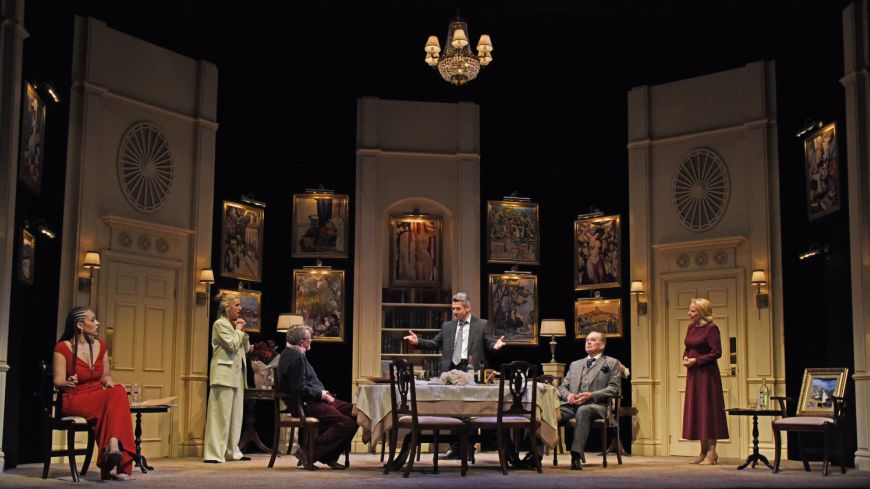
The publication of Knots & Crosses by Ian Rankin in 1987 introduced Inspector John Rebus, one of the most enduring characters in crime fiction - the 25th novel will be published in October. Amongst numerous accolades, Rankin has won four Crime Writers’ Association Dagger Awards including the prestigious Diamond Dagger, and America’s celebrated Edgar Award.
‘The reader should go to crime fiction to learn about the real world. Good does not always triumph in today’s crime fiction; evil cannot always be rationalised. What interests me is the soul of the crime novel – what it tells us about humanity, and crime fiction touches this deep need to ask questions and get answers’.
In his article ‘Why Crime Fiction is Good for You,’ Ian Rankin reflects on the ethical imperatives at the heart of crime writing, suggesting that it ought to invoke a self-conscious interrogation of the dark underside of society.
The New Town, Edinburgh is the setting for ‘Rebus: A Game Called Malice’ which dramatises a dinner party hosted by Harriet and Paul Godwin at their home, 75 Heriot Row (which does not really exist). Georgian curved walls feature their collection of Scottish Colourist paintings with two doors leading to the hallway. Sitting around the large oval dining table are their four guests - Jack, a rather dodgy casino owner and his much younger, glamorous partner, Candida, the slickly-stylish Stephanie, an advocate and 'her date' for the evening, DI John Rebus.
Harriet has devised an after-dinner entertainment, a puzzle to solve the murder of the fictional Lord Manningham; given a list of Cluedo-style characters, potential weapons and floor plans, perhaps he was killed with a vase in the billiard room? Rather bored, Candida suggests ‘the servant always does it’, as she twitters on social media, posting influential pics of the scallops which chef Brendan prepared for dinner.
Rebus does not get involved either and merely listens to the discussion, more intrigued by the other guests. When asked, ‘How has policing changed since Dixon of Dock Green ?’ he replies that crime is still based on the Seven Deadly sins, detective work is still the same, just with more technology. He later steps forward, the lights dimmed to give a quiet soliloquy, sharing his personal views on the guests at this party surrounded by art, books, flowers. He cannot seem to relax, too focussed on using his skills of detection to ‘read the room’, assess and analyse the situation.
The conversation around the table is also interrogatory, where did Jack meet Candida and how did he get into the casino businesss. Rebus is invited to come along one night, ‘a pile of chips for you on the house,’ to which he drily replies, ‘is that with brown sauce or vinegar’? Light hearted, sardonic humour is sprinkled like a hot spice through the play as anecdotes reveal stories of deaths, divorce and drowning of their various spouses.
When a real dead body is found in the en suite of the master bedroom, Rebus takes command before the police arrive.
Rankin was inspired by the morality play, An Inspector Calls by J.B. Priestley which takes place in 1912 during a dinner party arranged by Arthur and Sybil Birling to celebrate the engagement of Sheila to her fiancé Gerald. The unexpected arrival of Inspector Goole turns their private, privileged Edwardian social world upside down with the news of the death of a young girl. The Birling family and Gerald were all acquainted with her and committed crimes based on the Seven Deadly sins.
Echoing this dramatic structure, Detective Inspector Rebus now interrogates all the dinner guests to find out hidden secrets and past encounters which may link them to the victim upstairs or other sinful activity. The surname Godwin is perhaps chosen with subtle care.
Gray O’Brien portrays Rebus in a fresh, contemporary manner as a slim, fit, rather youthful fifty something guy, although he is meant to be retired from the force. Invited to the party as Stephanie’s friend, he appears to be the outsider, sipping a dram while constantly observing the action with a quiet, unsettling presence. Rather Goole-like, in fact, as he seeks to unveil the truth. Teresa Banham plays Harriet with elegant charm complemented by Neil McKinven’s casual nonchalance as her husband Paul, while Abigail Thaw is cool, confident, calculating as Stephanie.
However, the script is at times convoluted and confusing as we try to pick up the essential backstory of the characters through the fast-flowing dialogue, often spoken in an inaudible tone of voice. Lighting, music and sound effects create a chilling ambience but this game of malice is light, comedic entertainment, verging on farce. The final, briskly delivered, denouement is seriously disappointing and while not all crime drama reach a neat resolution, here there are many questions left unanswered in the decorative dining room at 75 Heriot Row.
Showtimes:
10 – 14 September, 2024 @ 7.30pm. Matinee, Thursday and Saturday, 2.30pm.
Ticket prices from £25
https://www.capitaltheatres.com/whats-on/all-shows/rebus-a-game-called-malice/2339
UK Tour:

